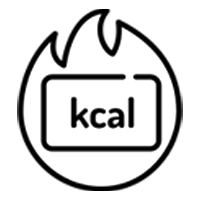Show summary Hide summary
How many calories do we burn doing fitness training?

Everything you need to know about fitness training
Do you know how many calories you can burn when doing fitness training for 30 minutes or 1 hour? By entering your overall activity time and your weight in kilos, you can get an idea of how many calories you burn doing fitness training.
Fitness training: A few examples of energy expenditure depending on weight and activity time.
Use the table below to see how many calories you can burn during a fitness training session!
Fitness training
Low intensity
Kilocalorie expenditure
| Weight | 15 minutes | 30 minutes | 1 hour |
|---|---|---|---|
| 40 kg | 42 | 84 | 168 |
| 50 kg | 53 | 105 | 210 |
| 60 kg | 63 | 126 | 252 |
| 70 kg | 74 | 147 | 294 |
| 80 kg | 84 | 168 | 336 |
| 90 kg | 95 | 189 | 378 |
Fitness training
Average intensity
Kilocalorie expenditure
| Weight | 15 minutes | 30 minutes | 1 hour |
|---|---|---|---|
| 40 kg | 63 | 126 | 252 |
| 50 kg | 79 | 158 | 315 |
| 60 kg | 95 | 189 | 378 |
| 70 kg | 110 | 221 | 441 |
| 80 kg | 126 | 252 | 504 |
| 90 kg | 142 | 284 | 567 |
Fitness training
High intensity
Kilocalorie expenditure
| Weight | 15 minutes | 30 minutes | 1 hour |
|---|---|---|---|
| 40 kg | 95 | 189 | 378 |
| 50 kg | 118 | 236 | 473 |
| 60 kg | 142 | 284 | 567 |
| 70 kg | 165 | 331 | 662 |
| 80 kg | 189 | 378 | 756 |
| 90 kg | 213 | 425 | 851 |
See detailed calculations and metabolic equivalent for fitness
Everything you need to know about fitness training
FIND OUT MORE ABOUT FITNESS TRAINING
The word fitness literally means ” physical fitness “, and encompasses a wide range of disciplines such as cardio-training, aerobics and dance fitness. This sport is part of the top 10 best sports for losing weight.
The many disciplines that make up fitness use different exercises to strengthen muscle development and tone and sculpt the body.
Fitness, also known as physical training, encompasses a range of physical activities designed to develop and maintain physical fitness. It encompasses various types of exercise, such as cardio, strength training, flexibility and coordination. Fitness is a popular part of a healthy, active lifestyle, and can be adapted to all fitness levels.
Some benefits of fitness training:
- Improved cardiovascular fitness: Fitness activities such as running, cycling, rowing and cardio classes help improve cardiovascular health by strengthening the heart and lungs. These exercises increase lung capacity, improve blood circulation and reduce the risk of cardiovascular disease.
- Muscle strengthening: Weight-building exercises, such as weightlifting, weight training and machine training, help to strengthen and tone muscles. By working different muscle groups, fitness promotes balanced musculature, better posture and greater physical strength.
- Weight control: Fitness is an excellent way to maintain a healthy weight or lose weight. Cardio activities help burn calories, while strength training builds muscle mass, which speeds up metabolism and promotes fat burning.
- Improved flexibility: Stretching and flexibility exercises, such as yoga, Pilates and stretching, improve flexibility and range of motion. This helps prevent injury, promotes better posture and facilitates everyday movement.
- Boosting energy and mood: Fitness releases endorphins, the happy hormones, which can have a positive impact on energy, mood and stress reduction. Regular exercise can help combat fatigue, improve concentration and promote an overall sense of well-being.
- Disease prevention: Regular fitness practice can help prevent various diseases, such as heart disease, type 2 diabetes, osteoporosis and certain types of cancer. Regular physical activity boosts the immune system, improves bone and joint health, and contributes to healthier aging.
In conclusion, fitness training is a beneficial practice for both physical and mental health. It offers a multitude of benefits, such as improving cardiovascular fitness, strengthening muscles, managing weight, improving flexibility, boosting energy and mood, and preventing disease.
How to calculate the number of calories burned doing fitness training
The result displayed is expressed in Kcal and is calculated from the MET (Metabolic Equivalent of Task). The MET for each activity is the result of statistical data and cannot therefore be interpreted as an exact calculation, but rather as an estimate taking into account the MET value and the ratio between the time spent doing an activity and the weight of the individual.
For example: the MET value for fitness training at normal intensity is 6. This means that a fitness exerciser consumes 6 times more energy than at rest during a fitness session.
MET values for different fitness intensity levels
- Low-intensity fitness training: MET = 4
- Medium-intensity fitness training: MET = 6
- High-intensity fitness training: MET = 9
Discover the detailed formula to calculate your daily energy expenditure while doing fitness training
Consumption in Kcal per minute = (MET*3.5*Weight in kilos)/200
This means that for a 70-kilo person exercising for 30 minutes:
Consumption in Kcal per minute = (6*3.5*70)/200 = 7.35 Kcal/mn
So for 30 minutes = 7.35*30 = 220.5 kcal for 30 minutes
All sports in detail!
Discover: Tips for long-term weight loss














































